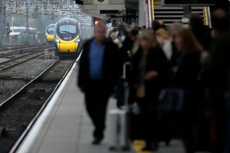Drivers warned of ‘traffic nightmare’ during Christmas journeys amid road staff strikes
Fears people could be stranded for longer in ‘life-threatening’ motorway breakdowns as control room staff take industrial action

Motorists have been warned that their journey home for Christmas could spiral into a “nightmare” as traffic surges to pre-pandemic levels and road workers stage four days of strikes.
Close to 17 million drivers are expected on the roads on Friday and Christmas eve, according to the AA, with others estimating that a third of regular train users will choose to travel by car instead in the face of wide-scale industrial action by rail workers.
But drivers could face a higher-than-usual risk of “life-threatening” delays for assistance in the event of a motorway breakdown, as frontline National Highways staff also walk out from Thursday until Christmas in London and the South East as part of an industrial dispute.
The strikes are likely to weaken the ability to respond and deal with collisions, cause delays in re-opening carriageways and motorways, and impact the ability to set up signs and signals to warn motorists of blockages and accidents, the Public and Commercial Services Union (PCS) has said.
This “may leave drivers more vulnerable on smart motorways if they break down”, AA president Edmund King told The Independent in a statement on Thursday.
National Highways insisted it was confident the strikes “will have minimal overall impact”, and said it expects up to around 30 of its 1,500 frontline staff to strike at any given point, claiming that just three employees were striking at the time of its response to The Independent on Thursday – a figure PCS said it did not recognise.
But campaigners warned that in a motorway breakdown scenario “every second counts” and that delays of just a few minutes can cause additional accidents on the roads.
“The longer a vehicle sits stationary without assistance or setting of warning signs around it the higher the risk of a collision,” said Neil Greig, Director of Policy and Research at IAM RoadSmart.
“The image of the strike may look minimal in total but for anyone left stranded for a minute or two longer than usual the stress will be huge – it can be life-threatening, even a few minutes can make the difference between getting involved in a collision or not.”
The “minimal” impact cited by National Highways will still “certainly impose a risk due to the importance of time in rescuing people”, Mr Greig told The Independent, adding: “National Highways need to be transparent as to which regions are most affected and what they expect drivers to do if they breakdown.”

National Highways has said that it has “well-rehearsed resilience plans to continue managing and operating our network safely” and previously suggested that, if resources are low at one regional call centre, another will be able to help manage the workload.
“Millions of people rely on our roads and there is a possibility that they may be busier than usual on strike days, particularly when they correspond with industrial action on other transport modes,” said Duncan Smith, executive director of operations, who urged drivers to “take extra care”.
In a survey of 12,000 people, the AA has estimated that more than 16.5 million people will take to the roads on Friday, rising to around 16.8 million on Saturday, and it has issued an “amber alert” to prepare drivers for likely congestion – particularly between 10am and 6am on Friday, and 10am until 4pm on Christmas Eve.
Several of the motoring organisation’s “Christmas travel hotspots” – the M25, M3 and M4 – are in areas impacted by the PCS strikes in the coming days, the AA’s president said.
“Driving home for Christmas could spiral into a traffic nightmare if motorists get caught out. We’ve issued an amber traffic warning for Friday and Christmas Eve due to an expected 17 million drivers on the roads,” said Mr King.
“Local authorities and National Highways have cancelled non-essential roadworks this weekend, but even that may not be enough to deal with the swell in traffic brought on by the rail strikes.
“According to data from the location app what3words, one-third of regular train users plan to travel by car this weekend instead, so motorists need to be prepared for delays and set off earlier if they can.
“Regional strikes by some National Highways workers and control centre staff could also stretch resources and may leave drivers more vulnerable on smart motorways if they breakdown although National Highways has stressed the effects will be limited.”
National Highways employees – who look after the 4,300 miles of motorways and major A roads in England – are just one of many groups of workers fighting against real-term wage cuts this Christmas, joining tens of thousands of rail workers, nurses, paramedics and Royal Mail staff.
“While we don’t relish causing disruption to people travelling over the Christmas period, it’s an inevitable consequence of the position we’ve been forced into by the government,” said PCS general secretary Mark Serwotka.
“Our National Highways members – the people who keep the roads running – have been offered an increase that falls below the rate of inflation of almost 11 per cent.
“We make it very clear any blame for the disruption caused by this action lies at the doors of Downing Street. If the prime minister or chancellor put money on the table, we’d be happy to start negotiations.”
A PCS spokesperson added: “We are taking action in an area of Highways work that we know is chronically understaffed as well as underpaid. Given the understaffing, any action will cause operational difficulties – which is what is happening.”
Join our commenting forum
Join thought-provoking conversations, follow other Independent readers and see their replies
Comments




Bookmark popover
Removed from bookmarks